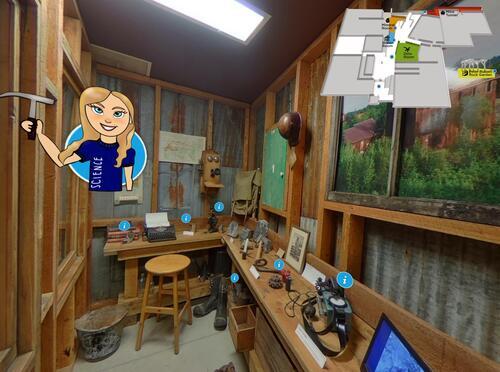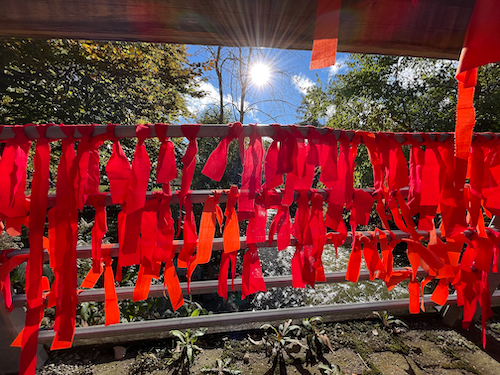The Daily Bulletin is published by Internal and Leadership Communications, part of University Communications
Contact us at bulletin@uwaterloo.ca
Submission guidelines
Editor:
Brandon Sweet
University Communications
bulletin@uwaterloo.ca
 Professor Vic DiCiccio has been named interim Associate Vice-President, Enterprise Engagement as part of the University's efforts to expand its efforts in lifelong learning and professional education to support the workforce of the future.
Professor Vic DiCiccio has been named interim Associate Vice-President, Enterprise Engagement as part of the University's efforts to expand its efforts in lifelong learning and professional education to support the workforce of the future.
DiCiccio's appointment, announced in a memo from Professor Charmaine Dean, vice-president, research and innovation earlier this week, comes about in light of the partial secondment of Sanjeev Gill, associate vice-president, innovation, to WatSPEED, which has been in effect since April 2020.
"As his work in WatSPEED will continue to be a priority for the institution and will require his full attention for another year, we are now appointing an Interim Associate Vice-President to assume other innovation portfolio responsibilities, those related to corporate and not-for-profit partnerships, as well as associated legal and research security functions," writes Dean. "These are functions related to the area of enterprise engagement."
"In his new role as Interim Associate Vice-President, Enterprise Engagement, Vic DiCiccio will increase the opportunities for UWaterloo’s external engagements with industry, alliances, not-for-profits and governments to accelerate our research and its impact, Dean's memo continues. "He has always worked closely with the Office of Research, and I look forward to his leadership in this strategically important role."
Vic DiCiccio is an Honorary Member of the University. As the previous Director of the Institute for Computer Research, he fostered large scale interactions for UWaterloo researchers with organizations, companies and research networks, aiding knowledge mobilization and supporting industry collaboration and development.
DiCiccio's appointment went into effect on November 1 and is expected to last for 10 months.
"I would like to take this opportunity to thank various members of the Office of Research, particularly Catherine Burns, for her support to my office, over the last 18 months, of the portfolio of duties that Vic DiCiccio will assume," Dean's memo concludes.

A message from the Earth Sciences Museum.
The Earth Sciences Museum is excited to announce the launch of our newest project, a virtual tour of the museum.
Our new tour allows users to explore various areas of the Earth Sciences Museum and Peter Russell Rock Garden, and access spaces that are not open to the public during a normal museum tour, including a minerology teaching laboratory and research spaces.
Step (virtually) right into the mining tunnel office, immerse yourself in the dinosaur pit, explore a teaching lab and hear stories from mineral collectors, and visit the metal isotope and geochemistry research laboratory to learn about research and scientific instruments from Brian Kendall and Chris Yakymchuk, professors in the Department of Earth and Environmental Sciences.
Each area is filled with a variety of clickable facts, photos and recordings from experts to facilitate learning, self-guided discovery, and allow people to see the museum collection and exhibits in unique new ways.
The virtual tour was created by the Earth Sciences Museum in collaboration with students from the Knowledge Integration program. Special thanks goes to Professors Brian Kendall, Chris Yakymchuk and John Spoelstra and the friends and supporters of the Museum who were involved in making this project a reality!
Explore the virtual tour of the Earth Sciences Museum yourself.

By Joy Braga, Indigenous Relations communications and engagement assistant.
Today marks the last day of Treaties Recognition Week 2021. The Office of Indigenous Relations would like to thank everyone who attended the events that took place this week and dedicated time to learn more about the significance of treaty rights, relationships, and their relevance today.
Treaties are a foundational part of Canadian society. All people, both Indigenous and non-Indigenous, have treaty rights and responsibilities. We are all treaty people. These agreements provide a foundation for living together and sharing the land that Indigenous Peoples traditionally occupied. They also lay the groundwork for continued cooperation and partnership as we move forward together to advance reconciliation in Canada.
To achieve lasting reconciliation with First Nations, Inuit, and Métis peoples, it is key that we honour the treaty relationship and negotiate new treaties based on the recognition of rights, respect, cooperation, and partnership.
Although the week is over, it is important to remember that treaties are more than events and they are relevant every week of the year, not only during the first week of November. The Office of Indigenous Relations encourages all members of the Waterloo campus community and beyond to continue learning about the land we live and work on, and the importance of treaty rights and relationships. To support you in your learning journey, the Office of Indigenous Relations prepared an Information and Resource Guide for Treaties Recognition Week 2021 (PDF).
This year, the Office of Indigenous Relations launched a new Knowledge Guide Series, focused on Phil Monture’s lecture, Treaties from a First Nation Perspective. There are five parts to this series, each containing a Knowledge Guide and video clip that explores the historical and ongoing significance of treaties, particularly the Haldimand Treaty.
On Wednesday, November 3, there was an Opening Ceremony and Fire for the Bridge: Honouring Lives of Missing and Murdered Indigenous Women, Girls, and Two Spirit People. The Bridge is an annual installation for 16 Days of Activism Against Gender-Based Violence at the University of Waterloo. The installation is a space for all University community members to learn about the crisis as they reflect upon their responsibilities, write a name on red fabric, and tie it to the bridge between Environment 3 and St. Paul's University College. This year, orange fabric was included with the red in remembrance of the lives of the children and youth who perished at the hands of institutional violence at residential schools. Everyone is welcome to participate in the Bridge’s closing ceremony on Friday, November 19 at 1:00 pm. Learn more about The Bridge Installation.
The Office of Indigenous Relations also hosted a free, virtual community screening of the acclaimed film, Trick or Treaty?, directed by Alanis Obomsawin. This screening was followed by a discussion with Robin Stadelbauer, Indigenous Relations Coordinator and Professor Susan Roy. The film focuses on Treaty No. 9 and the often-contradictory interpretations of treaties between First Nations and the Crown, powerfully portraying one community’s attempts to enforce their treaty rights and protect their lands. Learn more about the film Trick or Treaty? and director, Alanis Obomsawin.
For more information about these events and others hosted by Ontario’s Ministry of Indigenous Affairs, visit the Treaties Recognition Week webpage.

A message from the Water Institute.
The Water Institute is pleased to release its 2020-21 Impact Report, a reflection on how its members have made an impact in the past year addressing some of the world's most pressing water challenges.
This year’s publication, available in an interactive digital format, provides a sample of their innovative, interdisciplinary and international accomplishments.
The Water Institute’s mission is to facilitate collaboration, support excellence, and promote innovation in interdisciplinary water research and education. The Water Institute is ranked among the world’s top academic water research organizations.
Browse the interactive report here.

By Jon Parsons. This article was originally featured on Waterloo News.
A company founded by two University of Waterloo graduates is on track to become a giant in the Canadian B2B credit card market.
Float, which was co-founded by Cheriton School of Computer Science alums Griffin Keglevich and Ruslan Nikolaev, recently brought in a whopping $37 million CAD in new investments.
The company was created out of work the two former students did with the University of Waterloo’s startup incubator, Velocity.
“Float has shown tremendous growth since their time at the Velocity incubator and this new round of investment puts them on the path to join other Canadian unicorns in a few years,” said Adrien Côté, Velocity’s executive director.
“Often with start-ups, it comes down to a team committed to finding the right opportunity and we're honoured that Velocity could support the Float team as they found their early path to success.”
Along with their technical know-how and programming skills, Keglevich and Ruslan completed a double degree program, pairing computer science at Waterloo with business at neighbouring Wilfrid Laurier’s Lazaridis School.
Float has not disclosed any overall valuation, but with ongoing interest and investments from major players in the financial-tech sector it is expected the company is on the cusp of massive growth. The company was founded in 2019 and only six months ago was looking for seed funding.
Large investments at this stage are often seen as a key indicator of potential.
The company’s third co-founder and current CEO, Rob Khazzam, who joined Float in March 2021, brings a wealth of experience in business and finance, having previously worked for Uber and various venture capital advisory firms.
The products and services Float offers include an all-in-one corporate credit card and spending management solution for Canadian businesses. The basic products are a derivative of more-typical credit cards, but with services specially suited to the needs of businesses.
A company could get a credit card for one of its employees for just one business trip, for example, or for just one type of purchase, or a common account for a whole department.
Float also offers services to approve, manage, track and report spending through integrated applications and software. The adaptability and easy integration of its services for businesses are key characteristics of the company’s offerings.

We're back. The latest episode of the Beyond the Bulletin podcast is now live. Professor Blair Feltmate, from the Intact Centre on Climate Adaptation, shares his proven methods for generating interest in research to create lucrative partnerships with industry, and inform the public and influence policy through the media. Six women from UWaterloo are among the Women’s Executive Network’s 100 most powerful women in Canada. Vivek Goel will be soon be installed as the University’s seventh president and vice-chancellor.
Students can visit the Student Success Office online for supports including academic development, international student resources, immigration consulting, leadership development, exchange and study abroad, and opportunities to get involved.
Instructors looking for targeted support for developing online components for blended learning courses, transitioning remote to fully online courses, revising current online courses, and more please visit Agile Development | Centre for Extended Learning | University of Waterloo (uwaterloo.ca).
Instructors can visit the Keep Learning website to get support on adapting their teaching and learning plans for an online environment.
Course templates are available within your course in LEARN to help you build and edit your content and assignment pages quickly.
The following workshops, webinars, and events are offered by the KL team (CTE, CEL, ITMS, LIB):
Thirty Minute Thursdays – PebblePad – Offered: November 11, November 18, November 25, 12:00 noon to 12: 30 p.m.
Online Instructional Skills Workshop (ISW) (CTE8601), begins on October 22, 8:00 a.m.
Getting Ready to Facilitate Online Courses: TA Training, beginning November 1.
Employees can access resources to help them work remotely, including managing University records and privacy of personal information. Here are some tips for staying healthy while working from home.
Stay informed about COVID cases on campus by consulting the COVID case tracker.
The Writing and Communication Centre has virtual services and programs to help undergrads, grad students, postdocs and faculty members with academic writing.
Co-op students can get help finding a job and find supports to successfully work remotely, develop new skills, access wellness and career information, and contact a co-op or career advisor.
The Centre for Career Action (CCA) is offering some in-person services for fall 2021. The Tatham Centre is open with front-desk support, limited in-person appointments and co-op consults. Services are also available virtually. Book an appointment online or Live Chat with our Client Support Team. The CCA is here to help.
If you feel overwhelmed or anxious and need to talk to somebody, please contact the University’s Campus Wellness services, either Health Services or Counselling Services. You can also contact the University's Centre for Mental Health Research and Treatment. Good2Talk is a post-secondary student helpline available to all students.
While the Library continues to focus on digital resources and consultations, our spaces are open for the fall term. Dana Porter Library is open Monday to Friday, 9 a.m. to 5 p.m., and Davis Centre Library is open Monday to Friday, 9 a.m. to 11 p.m., and Saturday and Sunday, 11 a.m. to 5 p.m. for drop-in individual study space, bookable individual study rooms, drop-in access to computers and printers, book pick-up services and IST Help Desk support. Special Collections & Archives and the Geospatial Centre will be accessible by appointment. Library staff are available for questions via Ask us. Full details on current services and hours are available on the Library’s COVID-19 Update webpage.
The Faculty Association of the University of Waterloo (FAUW) continues to advocate for its members. Check out the FAUW blog for more information.
The University of Waterloo Staff Association (UWSA) continues to advocate for its members. Check out the UWSA blog for more information.
The Sexual Violence Prevention and Response Office (SVPRO) supports all members of the University of Waterloo campus community who have experienced, or been impacted, by sexual violence. This includes all students, staff, faculty and visitors on the main campus, the satellite campuses, and at the affiliated and federated Waterloo Institutes and Colleges. For support, email: svpro@uwaterloo.ca or visit the SVPRO website.
The Office of Indigenous Relations is a central hub that provides guidance, support, and resources to all Indigenous and non-Indigenous campus community members and oversees the University's Indigenization strategy.
The Waterloo Indigenous Student Centre, based at St. Paul’s University College, provides support and resources for Indigenous students, and educational outreach programs for the broader community, including lectures, and events.
WUSA supports for students:
Peer support - MATES, Glow Centre, RAISE, Women’s Centre - Visit https://wusa.ca/peersupport to book an appointment either in person or online for the Fall term!
Food Support Service food hampers are currently available from the Turnkey Desk 24/7 in the Student Life Centre. Drop off locations are also open again in SLC, DC, DP, SCH and all residences.
Co-op Connection all available online. Check https://wusa.ca for more details.
Centre for Academic Policy Support - CAPS is here to assist Waterloo undergraduates throughout their experience in navigating academic policy in the instances of filing petitions, grievances and appeals. Please contact them at caps@wusa.ca. More information is available.
WUSA Student Legal Protection Program - Seeking legal counsel can be intimidating, especially if it’s your first time facing a legal issue. The legal assistance helpline provides quick access to legal advice in any area of law, including criminal. Just call 1-833-202-4571.
Empower Me is a confidential mental health and wellness service that connects students with qualified counsellors 24/7. They can be reached at 1-833-628-5589.
Healthy Warriors at Home (Online Fitness)
Warriors vs. Laurier Blood Donation Battle. Join your fellow Warriors, donate blood and help us win the Blood Battle against Laurier for a second year in a row. Set up a profile or add the PFL code: UNIV960995 to your account if you have a blood.ca account already. Questions? Contact WarriorsInfo@uwaterloo.ca.
Drop-in to Warrior Virtual Study Halls on Wednesdays from 5:30 p.m. to 7:00 p.m. Come together in this virtual space to set goals and work independently or in groups each week.
Renison English Language Institute continues to offer virtual events and workshops to help students practice their English language skills.
Men’s Volleyball vs. Western, Friday, November 5, 7:00 p.m., Home Opener. Purchase tickets.
NEW - Quantum Today: Simulating Quantum Particles on a Lattice, Monday, November 8, 12 noon, virtual talk, watch the live talk on YouTube: https://www.youtube.com/watch?v=VrRx58L2tn8.
Faculty workshop: Navigating your first probationary term, Monday, November 8, 1:00 p.m. to 2:30 p.m.
Presidential Installation, Monday, November 8, 4:00 p.m.
Faculty info session on definite-term contracts, Tuesday, November 9, 1:00 p.m. to 2:30 p.m.
Remembrance Day, Thursday, November 11.
NEW - Arriscraft Speaker Series: Praxes of Care: Caretaking featuring Annmarie Adams & David Theodore, moderated by Fiona Kenney, Thursday, November 11, 6:00 p.m. Register for this event.
NEW - Centre for Sight Enhancement webinar, “Addressing the Global Vision Crisis: Coping and Living with Low Vision”. Thursday, November 11, 7:00 p.m. to 8:30 p.m. via Zoom.
NEW - Warriors Basketball vs. Windsor, Wednesday November 10, 6:00 p.m. to 8:00 p.m., home opener, Alumni Day. Purchase Tickets.
NEW - WaterTalk: York Region’s One Water Story… recognizing the value of water in all its forms, presented by Erin Mahoney, Friday, November 12, 2:30 p.m.
The Daily Bulletin is published by Internal and Leadership Communications, part of University Communications
Contact us at bulletin@uwaterloo.ca
Submission guidelines
The University of Waterloo acknowledges that much of our work takes place on the traditional territory of the Neutral, Anishinaabeg, and Haudenosaunee peoples. Our main campus is situated on the Haldimand Tract, the land granted to the Six Nations that includes six miles on each side of the Grand River. Our active work toward reconciliation takes place across our campuses through research, learning, teaching, and community building, and is co-ordinated within the Office of Indigenous Relations.